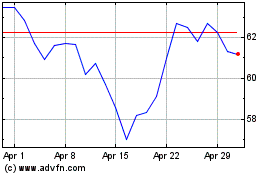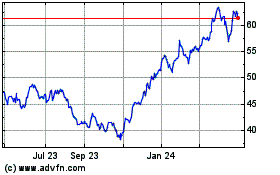By David Benoit
On the first Friday night in November, bank investor Ben
Mackovak sat outside his Cleveland home smoking a cigar,
contemplating the ruin in his portfolio.
It had been a brutal year and he'd just taken another beating.
The day after the U.S. election, the Nasdaq Bank Index he uses as a
benchmark suffered its worst underperformance against the S&P
500 since 1987. Mr. Mackovak no longer saw a path to the higher
interest rates that banks need to make more money in the coming
years.
"It was a gut punch," he said.
Come Monday night, Mr. Mackovak, co-founder of the $270 million
fund Strategic Value Bank Partners, believed the industry was
saved. Pfizer Inc. was making progress on a Covid-19 vaccine. The
Nasdaq Bank Index had its best day since 1984. Mr. Mackovak, not a
regular smoker, took out another cigar -- this time a Cuban.
"It's very unusual to have two paradigm shifts in six days," he
said.
The year 2020 will go down as one of the most volatile -- and
likely one of the worst -- for bank stocks on record.
More broadly, the stock market is soaring even as the economy
continues to stumble amid the pandemic. The Dow Jones Industrial
Average is nearing the symbolic 30000 threshold, and the S&P
500 hit new records this month. Giant technology companies like
Facebook Inc. and Amazon.com Inc., which have benefited from
stay-at-home directives, have fueled the market's rise. The lesser
performance by banks, viewed as closely tied to the fortunes of
consumers and businesses, highlights the disparity between a
rallying market and a troubled economy.
The past few weeks in particular sent bank investors whipsawing.
The day after the election was among the worst days ever for bank
stocks when compared with the S&P 500. Three sessions later,
news broke that a vaccine developed by Pfizer and BioNTech SE
proved better than expected at protecting people from Covid-19, and
banks had one of their best days.
Investors, for their part, can't quite decide what to think.
They increased their allocation to banks by more than for any other
sector this month, according to a Bank of America Corp. survey. At
the same time, betting against banks remained the second-most
popular trade in the survey.
Bank investors admit it has been a bad year, with clients
pulling money and some funds closing. Even Warren Buffett's
Berkshire Hathaway Inc. has sold down its holdings of JPMorgan
Chase & Co. and Wells Fargo & Co.
The index for the biggest banks, the KBW Nasdaq Bank Index, is
down 22% for the year. It remains on pace to underperform the
S&P 500 by more than any year on records going back to
1993.
When the economy started recovering this summer and other
industries rallied, banks stayed beaten down. There are concerns
that people will stop paying loans en masse as the pandemic
stretches on. The Federal Reserve plans to keep interest rates low,
which hurts margins. Loan growth is expected to be anemic.
There were a few bright spots in October. Trading revenue
powered profits at Wall Street heavy hitters Goldman Sachs Group
Inc. and Morgan Stanley. JPMorgan, Citigroup Inc. and others slowed
their stockpiling for bad loans. Smaller banks started buying back
stock again. There were even some deals announced. Many investors
bet that Democrats would sweep the results on Election Day and pass
a big stimulus package, providing another reason to bet on
banks.
Then, on Nov. 3, the nation voted.
After polls closed, it was apparent a Blue Wave wouldn't
materialize to easily push through new stimulus. Wall Street
quickly unwound those trades.
On Wednesday, Nov. 4, the big bank index fell 5% while the
S&P 500 rose 2.2%, the banks' worst comparative performance in
more than a decade. The KBW Nasdaq Regional Banking Index slumped
7.4%, its worst day ever compared with the broader benchmark.
The mood shifted dramatically the morning of Monday, Nov. 9, on
the Pfizer news. The market jumped. Banks soared. The KBW big bank
index rose 13.5%. The regional bank index jumped 16%, marking its
best-ever performance against the S&P 500.
Now the prevailing hope wasn't that a stimulus would prop up the
economy temporarily, but that the pandemic would end.
For Anton Schutz, portfolio manager of the RMB Mendon Financial
Services Fund, the year has been a struggle to keep clients and get
new ones.
But like many bank investors, he is feeling some measure of
relief thanks to the vaccine news and is betting his portfolio will
recover next year. He doesn't believe credit losses will be as bad
as first feared, which could turn the billions of dollars the banks
have put aside for potentially bad loans into 2021 profits.
He had been telling potential investors that a vaccine would
send the industry soaring, but some were reticent until after the
recent rally.
"You can sit there and say 'I told you so,'" he said, "but it
doesn't feel so good."
Write to David Benoit at david.benoit@wsj.com
(END) Dow Jones Newswires
November 22, 2020 05:44 ET (10:44 GMT)
Copyright (c) 2020 Dow Jones & Company, Inc.
Citigroup (NYSE:C)
Historical Stock Chart
From Mar 2024 to Apr 2024

Citigroup (NYSE:C)
Historical Stock Chart
From Apr 2023 to Apr 2024
